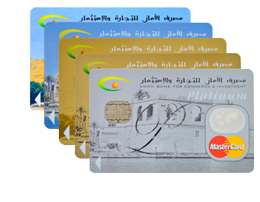By Libya Herald staff.

Malta, 31 December 2014:
Libya’s private-sector Aman bank, 40 percent owned by Portuguese BES bank, is offering replacement Mastercard . . .[restrict]debit cards to its customers with suspended Visa Electron debit cards.
The Amman bank Visa Electron card had had to be suspended upon instructions from Visa card due to Libyans using the card to withdraw large amounts of dollars abroad, and especially in Turkey, Amman bank reported.
This, Amman banks reports, had led the money laundering unit at Visa card to view these especially large withdrawals with suspicion.
Amman bank said that there has been large demand on debit cards by its customers over the last few months, in view of the economic and political situation in Libya, a fact that it has pointed out to Visa card. Amman bank also pointed out that it has been cooperating with the money laundering unit of visa card and is of the view that it has responded to all its queries.
To this end, Amman bank said that it was optimistic that the suspension of services by Visa card would be lifted soon. The bank pointed out that, meanwhile, normal withdrawals were still continuing for its Gold visa card and Net visa debit card customers.
In view of this suspension of its Visa debit cards, Amman bank has taken the step of automatically issuing replacement Mastercard debit cards to all its customers holding suspended Visa debit card.
The control of foreign currency transfers by the Central Bank of Libya (CBL) has affected debit cards issued by all Libyan banks.
Earlier in December, Libya’s National Commercial Bank (NCB) announced that it would be imposing an annual spending limit of LD 15,000 and a daily cash withdrawal limit of LD 500 on its Tourist Visa Debit Cards.
The NCB said that the decision wais based upon instructions from the CBL and Visa Card.
In September, the privately-owned Bank of Commerce and Development was forced to stop its customers from making cash withdrawals abroad using its Visa debit cards too. That move was also believed to be in response to some customers misusing the debit card in order to transfer foreign exchange out of Libya for foreign exchange trading purposes as opposed to for personal use.
The phenomena of some Libyan Visa debit card holders using their cards to trade in foreign currency comes as a result of the CBL controlling the amount of hard currency sold in Libya and not allowing the Libyan Dinar exchange rate to float.
The high demand and low supply of foreign currency has caused a thriving foreign currency black market in the country.
| Currency | CBL official rate | Black market rate |
| 1 Dollar | 1.20 | 1.79 |
| 1 Euro | 1.50 | 2.19 |
| 1 Sterling | 1.91 | 2.75 |
The official and black market exchange rates in Tripoli today
However, Libya’s political turmoil and fighting between the two main factions has meant that oil production has remained in the hundreds of thousands as opposed to the peak 1.5 million bpd. This has restricted Libya’s foreign currency earnings. The country is struggling with annual deficits and has had to dip into its currency reserves accumulated during the Qaddafi era. [/restrict]









